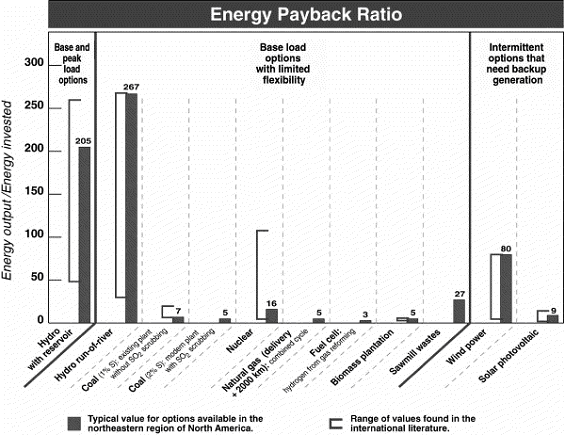
Fig. 5.
〔Gagnon,L., Belanger(最初のeの頭に´),C. and Uchiyama,Y.(2002): Life-cycle assessment of electricity generation options: The status of research in year 2001. Energy Policy, 30, 1267-1278.から〕
『Abstract
This articles presents the environmental impacts of electricity
generation systems, based on life-cycle assessments (LCAs). These
assessments normally include impacts from extraction, processing
and transportation of fuels, building of power plants and generation
of electricity.
The LCAs show that the following options have an excellent performance:
hydropower (run-of-river and with reservoir), nuclear energy and
windpower.
Hydropower with reservoir does have high land requirements, but
in spite of this, it is possible to conclude that it has the highest
performance, if we consider 2 factors not always included in LCAs:
firstly, reservoirs can provide secondary benefits such as irrigation
or flood control; and secondary, hydropower has a jigh operating
flexibility that can improve the reliability of electricity supply.
Keywords: Electricity; Life-cycle; Environment; Impact』
1. Methodology
1.1. Potential uses of life-cycle assessment
1.2. The exceptional case of hydropower
1.3. Main atmospheric issues covered by LCAs
1.4. Reliability of generation systems, a criteria for rigorous
comparisons
1.5. Main types of electricity generation systems
2. Results of life-cycle assessments
2.1. Greenhouse gas emissions
2.1.1. Environmental issues
2.1.2. Understanding the studies on greenhouse gas emissions
2.1.3. Main findings concerning greenhouse gas emissions
2.1.4. Future performance of energy systems concerning greenhouse
gas emissions
2.2. Acid precipitation
2.2.1. Environmental issues
2.2.2. Understanding the studies on SO2
emissions
2.2.3. Understanding the studies on NOx
emissions
2.2.4. Main findings concerning acid precipitation
2.2.5. Future performance of energy systems concerning acid
precipitation
2.3. Land requirements
2.3.1. Environmental issues
2.3.2. Understanding the studies on land requirements
2.3.3. Main findings concerning land requirements
2.3.4. Future performance of energy systems concerning land
requirements
2.4. Energy payback ratio
『2.4.1. Definition
For each power generation system, the “energy payback” is the
ratio of energy produced during its normal life span, divided
by the energy required to build, maintain and fuel the generation
equipment.』
2.4.2. Environmental issues
2.4.3. Understanding the studies on energy payback
2.4.4. Main findings concerning “energy payback ratios”
2.4.5. Future performance of energy systems concerning the payback
ratio
2.5. Other atmospheric emissions
2.5.1. Health issues
2.5.2. Comparing mercury contamination
2.6. Conclusion
References
 Fig. 5. 〔Gagnon,L., Belanger(最初のeの頭に´),C. and Uchiyama,Y.(2002): Life-cycle assessment of electricity generation options: The status of research in year 2001. Energy Policy, 30, 1267-1278.から〕 |